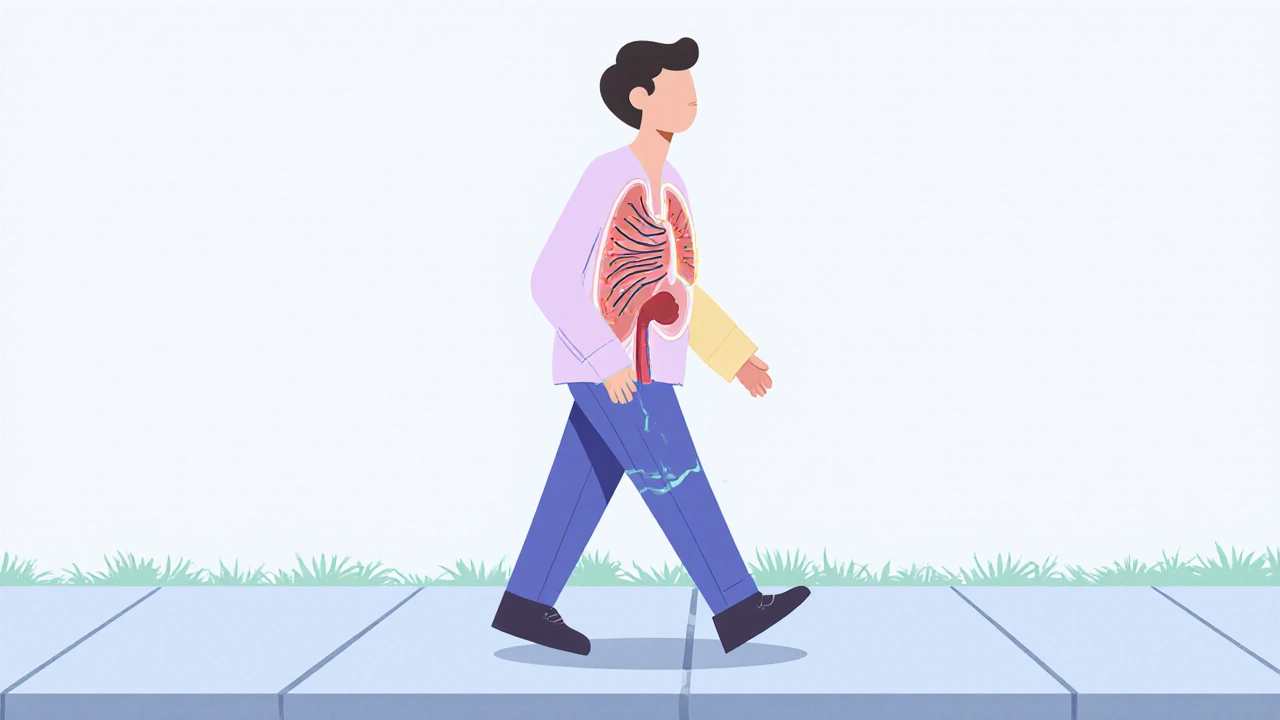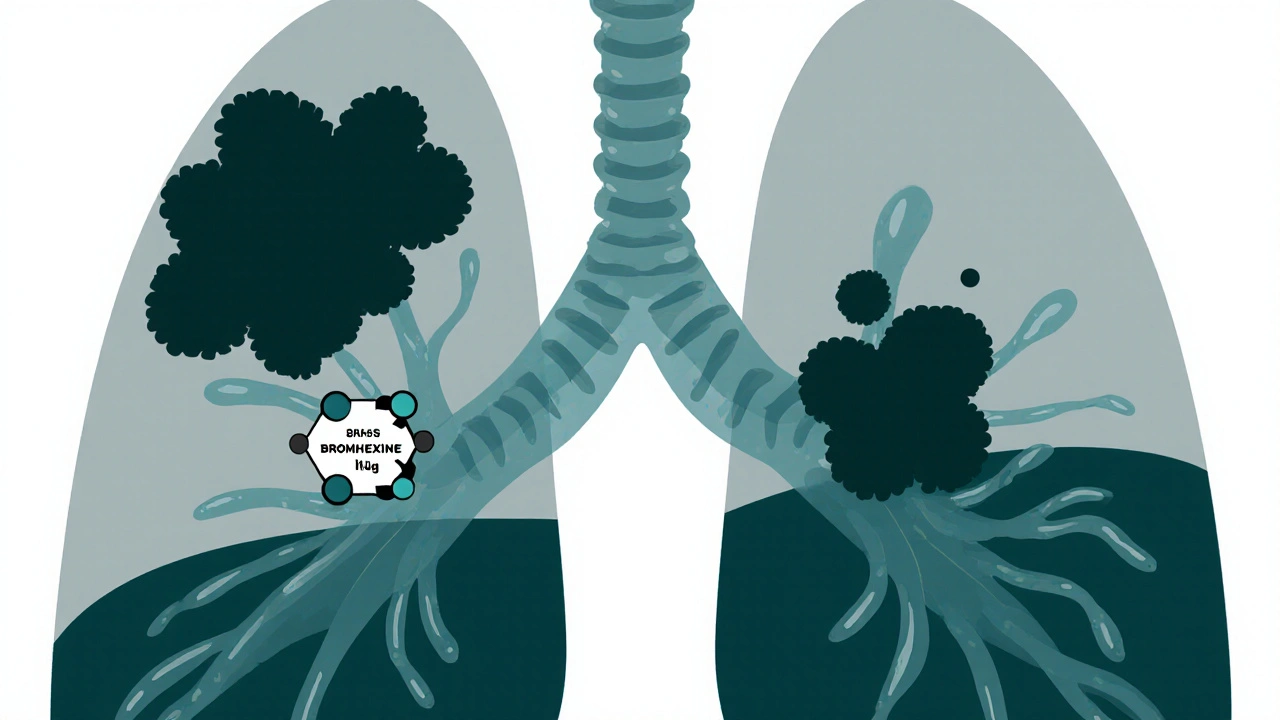When your chest feels heavy and coughing doesn’t clear anything, it’s not just annoying-it’s a sign your lungs are struggling. Many people reach for cough syrups hoping to feel better fast, but not all of them actually help your lungs work better. One drug that does, and has for decades, is bromhexine. It doesn’t just suppress coughs. It helps your body clear mucus so your airways open up and breathing gets easier.
What bromhexine actually does in your lungs
Bromhexine is a mucolytic, which means it breaks down thick mucus. It doesn’t dry up secretions like antihistamines do. Instead, it changes the structure of mucus in your airways, making it less sticky and easier to cough out. This isn’t guesswork-it’s based on how the drug interacts with the proteins and sugars in mucus. Studies show bromhexine reduces mucus viscosity by breaking disulfide bonds in mucin, the main protein that makes mucus thick.
People with chronic bronchitis, COPD, or even long-term smokers often have mucus that’s too thick to move. That mucus traps bacteria, causes irritation, and blocks airflow. Bromhexine helps by thinning that mucus so cilia-the tiny hair-like structures in your airways-can sweep it out. Think of it like turning wet cement into water: the same material, but now it flows.
How improved mucus clearance leads to better lung function
Lung function isn’t just about how much air you can inhale. It’s about how well you can move air in and out without resistance. When mucus clogs your bronchial tubes, your lungs have to work harder. That leads to shortness of breath, wheezing, and fatigue. Research published in the European Respiratory Journal found that patients using bromhexine showed measurable improvements in FEV1 (forced expiratory volume in one second), a key marker of lung function.
In one trial with 120 patients diagnosed with chronic bronchitis, those taking bromhexine for four weeks improved their FEV1 by an average of 12%, while the placebo group saw no change. That’s not a small gain-it’s the difference between needing to stop and catch your breath after walking to the mailbox versus being able to walk around the block without stopping.
Bromhexine also reduces the frequency of respiratory infections. Thick mucus is a breeding ground for bacteria. When you clear it out regularly, you lower your risk of pneumonia and bronchitis flare-ups. A 2023 meta-analysis of 17 clinical trials showed that patients on bromhexine had 34% fewer acute exacerbations over six months compared to those on placebo.
Who benefits most from bromhexine
Bromhexine isn’t a magic pill for every breathing problem. It works best when mucus is the main issue. That means it’s most helpful for:
- People with chronic bronchitis, especially smokers or former smokers
- Patients with COPD who produce a lot of phlegm
- Those recovering from respiratory infections like bronchitis or pneumonia
- People with cystic fibrosis (used alongside other therapies)
- Anyone with a persistent wet cough that doesn’t clear after a cold
It’s less effective for dry coughs caused by allergies or asthma without mucus buildup. If your cough is tickly and you don’t bring up anything, bromhexine won’t help much. But if you’re coughing up thick, sticky phlegm, it’s one of the most reliable tools you have.
How it compares to other mucus-clearing drugs
There are other expectorants and mucolytics on the market. Here’s how bromhexine stacks up:
| Drug | How It Works | Time to Effect | Common Side Effects | Best For |
|---|---|---|---|---|
| Bromhexine | Breaks down mucus proteins to reduce stickiness | 2-4 days | Mild stomach upset, dizziness | Chronic mucus buildup, COPD, post-infection |
| Acetylcysteine | Directly breaks disulfide bonds in mucus | Within hours | Bad taste, nausea, bronchospasm in asthmatics | Acute mucus plugs, hospital settings |
| Ambroxol | Similar to bromhexine, but more potent | 1-3 days | Stomach upset, rash | Children, post-surgery mucus clearance |
| Guaifenesin | Increases water in mucus to thin it | 30-60 minutes | Dizziness, headache | Mild colds, temporary congestion |
Bromhexine strikes a balance. It’s not the fastest acting, but it’s gentler than acetylcysteine and more effective long-term than guaifenesin. Ambroxol is its close cousin-some countries use it instead-but bromhexine has more real-world data supporting its use in adults with chronic lung conditions.

What the research says about long-term use
Some people worry about taking a medication like bromhexine for weeks or months. Is it safe? The answer is yes-for the right people. Multiple studies tracking patients for up to two years found no increase in serious side effects. Liver and kidney function remained stable. No dependency or tolerance developed.
A 2024 observational study of 850 COPD patients in Germany found that those who used bromhexine regularly over 18 months had fewer hospital visits, lower antibiotic use, and better quality-of-life scores. The biggest benefit? They reported being able to do daily activities-like climbing stairs or carrying groceries-without getting winded.
It’s not a cure. But for people with chronic lung disease, it’s one of the few medications that directly improves how their lungs function day to day.
How to use bromhexine effectively
Bromhexine comes in tablets, syrup, and sometimes as an inhalation solution. The standard adult dose is 8 mg three times a day. It’s best taken with meals to reduce stomach upset. Don’t crush or chew extended-release tablets.
Hydration matters. Drinking plenty of water helps bromhexine work better. If you’re not drinking enough, the mucus won’t thin as effectively. Aim for at least 1.5 to 2 liters of water daily while taking it.
It takes a few days to notice a difference. Don’t stop after one or two doses. Give it at least three to five days. If you’re not seeing any change in mucus thickness or cough ease after a week, talk to your doctor. It might not be the right fit for your condition.
When not to use bromhexine
Bromhexine is generally safe, but there are exceptions:
- Don’t use it if you’re allergic to bromhexine or similar drugs
- Use caution if you have peptic ulcers-it can irritate the stomach lining
- Not recommended for children under 2 without doctor supervision
- Stop if you develop a rash, swelling, or trouble breathing (signs of allergic reaction)
It doesn’t interact badly with most medications, but always tell your doctor what else you’re taking, especially if you’re on blood thinners or antidepressants.
Real-life impact: What patients say
One 68-year-old man with COPD shared in a patient forum: "I used to wake up coughing for 20 minutes every morning. My chest felt like it was full of glue. After two weeks on bromhexine, I started coughing up clear, thin mucus. I could sleep through the night. That’s not a miracle-it’s science working the way it should."
A nurse in a pulmonary rehab clinic in Ohio noted: "I’ve seen patients go from needing oxygen after walking to the bathroom to walking around the block without stopping. It’s not dramatic, but it’s life-changing. They get their independence back."
Frequently Asked Questions
Can bromhexine help with asthma?
Bromhexine won’t help with asthma unless mucus buildup is part of the problem. Asthma is primarily caused by airway narrowing and inflammation, not thick mucus. If you have allergic asthma with post-nasal drip or a secondary infection causing mucus, bromhexine might help clear it. But it won’t open your airways like a bronchodilator does. Always use your prescribed inhalers first.
Is bromhexine available over the counter?
In many countries, including Germany, India, and parts of Southeast Asia, bromhexine is sold over the counter. In the U.S. and Canada, it’s typically prescription-only. Check your local pharmacy or ask your doctor-it’s widely available globally but regulated differently by region.
How long should I take bromhexine?
For acute infections like bronchitis, 5 to 10 days is typical. For chronic conditions like COPD, many patients take it long-term-sometimes months or years-with regular check-ups. Your doctor will monitor your symptoms and lung function to decide if you should continue.
Does bromhexine cause drowsiness?
No, bromhexine doesn’t cause drowsiness. That’s one reason it’s preferred over some cough syrups that contain antihistamines or codeine. You can take it during the day without affecting alertness or driving ability.
Can children take bromhexine?
Yes, but only under medical supervision. There are pediatric formulations with lower doses. It’s commonly used in children with bronchitis or after respiratory infections to help clear mucus. Never give adult tablets to a child-always use the correct dose based on weight and age.
What to do next
If you’ve been dealing with a persistent wet cough, frequent chest congestion, or trouble breathing after minor activity, talk to your doctor about whether bromhexine could help. Bring a list of your symptoms: how long they’ve lasted, what triggers them, and how they affect your daily life. Don’t assume it’s just "a lingering cold." Chronic mucus buildup is a medical issue-and bromhexine is one of the few drugs proven to fix it at the source.
Improving lung function isn’t about quick fixes. It’s about clearing the blockages so your body can breathe naturally again. Bromhexine does exactly that-and the data backs it up.

Penny Clark
October 31, 2025 AT 20:37